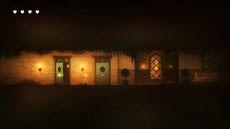‘Voxterium: Revision’ Preview – Voxels In The Air
Just as pixels can be used to represent two-dimensional shapes using small squares, voxels (or volumetric pixels) can be used to represent 3D shapes. Incredibly ugly 3D shapes. The one downside to the advent of Minecraft is a resurgence of voxel-based graphics that wouldn’t impress a Nintendo 64 programmer. “If Minecraft can get away with it, so can we!” is apparently a valid excuse for not collaborating with a 3D artist. Teasing aside, another point that Minecraft taught budding developers everywhere is that experimentation in game design is the best way to explore uncharted gaming territory. So, to bring you a new twist on Breakout, here’s Voxterium: Revision, a quote-unquote “polar shooter” currently in development by the one man-team of Ross Pinkstaff at Picardy-Third Entertainment.
Originally submitted as an entry in the Ludum Dare competition, Voxterium is a simple shooter game that involves looking inward at your target, rather than outward (the more typical option). For clarity, imagine a giant sphere rotating around some targets to shoot at, with a gun and camera mounted on the inside pointing towards the center. You, the player, rotate the sphere in any direction to hit targets, rather than just adjusting the rotation of the camera and gun. The targets are a handful of blocks glued together, some of which will replicate and expand outwards, others that contain powerups, and vanilla blocks that just sit there waiting for a friendly light bullet. Eliminating all the blocks clears the level, and challenge is ramped up by varyingly having the blocks replicate faster, blocks that attack back, or just having more of them or fewer powerup-giving blocks. Modes include survival, campaign play and high score, so there are plenty of ways to go about shooting these blocks, but hold on; what’s the meaning of all this?
The context of destroying these shiny blocks is to enhance the functionality of a piece of anti-virus software. Shooting reproducing blocks is analogized as destroying computer viruses before they can overwhelm system security. Thus, the powerups all have names reminiscent of computer programming terminology: byte, semaphore, throughput, recursion, etc. Why the viruses contain powerups I don’t know, but I’m not a programmer (yet). The graphics aesthetic is similarly hearkening back to what could be called the “good old days” of simple graphics comprised of geometric patterns floating in space. The neon hues and retro sound effects evoke reminiscence of the ATARI arcade games of the eighties, and the music adds to the theme as well, with an appropriate chiptune-inspired soundtrack. A rather tacky simile would be to compare the experience to a VJ mix with a shmup in it.
Voxterium has a lot going for it, and can certainly raise its hand when original gameplay concepts are called out. For such a simple twist on the shooter genre, the shooting mechanics are enjoyable and feel challenging enough to offer a variety of experience, which is more than you can ask from a lot of arcade-style games. What remains to be seen is how exactly this game will be released once it exits beta in May. Until then, prepare for release by finding a “game of life” visualization and try to click the pixels as they come to life.
More info can be found at the official Voxterium website, and the developer’s website. You can also follow Ross Pinkstaff on Twitter.






